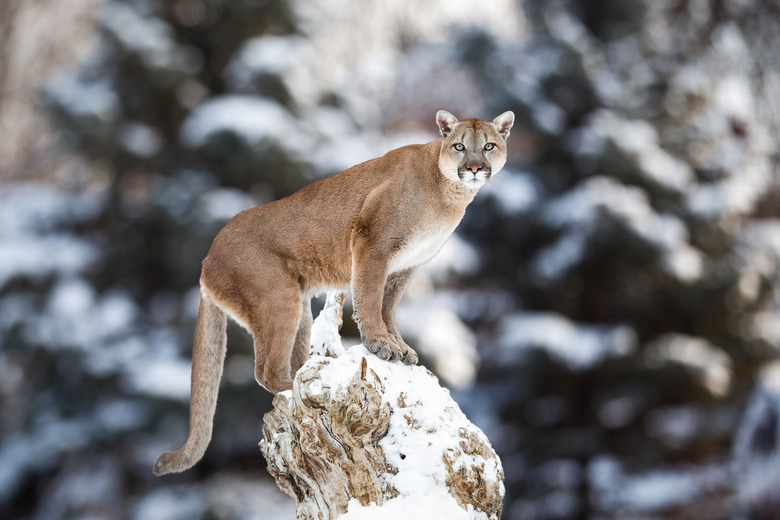What Eats A Wild Wolf?
In the food chain of the natural world, wolves are fairly close to the top. They compete with and kill other top predators, and are killed by other top predators in turn. There is no animal, however, that has a distinct advantage over wolves and hunts them — except, of course, for humans.
Humans
Humans
Wolves are, without a doubt, at the top of the food chain, but humans dominate just about all food chains on Earth and are able to hunt wolves. The only caveat is that humans must use technology to assure a win. Without a gun, knife or other weapon, a human is poorly matched against a wolf. And humans have no trouble eating canine meat, though it is not often done in North America. In other parts of the world, however, dog, which is a close relative of the wolf, is a commonly consumed meat.
Mountain Lions
Mountain Lions
Though wolves and mountain lions tend to avoid each other, environmental conditions sometimes force them together in the same hunting grounds, in which case they will fight, kill and presumably eat each other, since both are carnivores. Mountain lions and wolves are roughly the same size, though mountain lions are solitary creatures, whereas wolves tend to roam in packs, which would likely give the advantage to wolves when the two species do meet.
Bears
Bears
Bears are another top predator, like mountain lions, that wolves do not target often, but will kill, should a confrontation arise. Black bears, like mountain lions, are solitary, though a mother bear will sometimes have cubs of varying sizes with her. Bears, however, are typically larger than wolves, giving them a size advantage. The two species do sometimes kill each other and also seem to target the young of the other's species.
Scavengers
Scavengers
Of course many wolves are not killed and eaten as a result of a conflict with another species, but rather die of natural causes. In this case, there are many carnivorous scavengers that will eat a wolf carcass. The likely scavengers would vary, since wolves are found throughout the world in a wide range of environments, but birds, rodents and other large carnivores are all likely scavengers of a wolf carcass.
References
- "Wolves: Behavior, Ecology, and Conservation"; L. David Mech et al; November 2003
- "The Columbia Encyclopedia, Sixth Edition"; Wolf; 2008
Cite This Article
MLA
Robertson, Stuart. "What Eats A Wild Wolf?" sciencing.com, https://www.sciencing.com/eats-wild-wolf-8768779/. 13 March 2018.
APA
Robertson, Stuart. (2018, March 13). What Eats A Wild Wolf?. sciencing.com. Retrieved from https://www.sciencing.com/eats-wild-wolf-8768779/
Chicago
Robertson, Stuart. What Eats A Wild Wolf? last modified March 24, 2022. https://www.sciencing.com/eats-wild-wolf-8768779/
